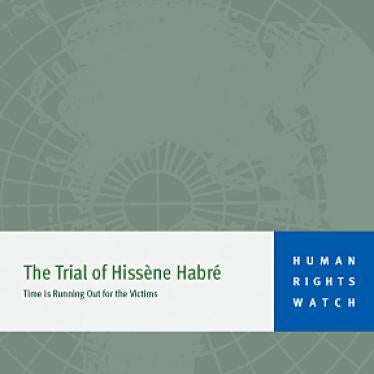(Dakar) – The decision of the Court of Justice of the Economic Community of West African States (ECOWAS) on November 5, 2013, about the Hissène Habré trial averts a potential obstacle in the path to justice for the long suffering victims of his rule, Human Rights Watch said today.
The ECOWAS court rebuffed Habré’s attempt to suspend the proceedings against him by the Extraordinary African Chambers, a special court created by agreement between the African Union and Senegal. On July 2, the Chambers charged Habré with crimes against humanity, war crimes, and torture.
“The ECOWAS court decision means the case against Habré can go forward,” said Reed Brody, counsel for Human Rights Watch who has worked with Habré’s victims since 1999. “A fair trial for Habré would be a turning point for justice in Africa.”
The decision handed down in Abuja, Nigeria, responds to an application filed by Habré’s lawyers on April 23 asking the court, as a provisional measure, to “order the immediate suspension of activities, investigations, and prosecutorial acts undertaken or to be undertaken within the framework of the application of the Chambers’ statute” on the ground that the Extraordinary African Chambers were not legitimate. Habré’s lawyers also alleged that he could not get a fair trial before the Chambers.
The court held that it did not have jurisdiction to rule on the application because the Extraordinary African Chambers were established pursuant to a treaty between Senegal and the African Union. In addition to rejecting the application for provisional measures, the court dismissed the underlying request, thus ending the case before it.
The ECOWAS court decision may end the boycott of the trial by Habre’s lawyers, which began with his indictment in July. In 2010, the ECOWAS court ruled that Habré would have to be tried before a “special ad hoc procedure of an international character.” In its November 5 decision, the court recognized that the Extraordinary African Chambers were created in the courts of Senegal to conform to its 2010 decision.
“The ECOWAS court’s decision is a huge relief to the victims who have been waiting for 23 years to see Habré brought to justice,” said Souleymane Guengueng, who nearly died during almost three years of mistreatment in prisons controlled by Habré’s political police, and later founded the Association of Victims of Crimes of the Regime of Hissène Habré (AVCRHH). “I want to see Habré in court before even more survivors die.”
Habré was president of Chad from 1982 until he was deposed in 1990 by the current president, Idriss Déby Itno, after which Habré fled to Senegal and lived in exile. Habré’s one-party rule was marked by widespread atrocities, including the targeting of particular ethnic groups. The files of Habré’s political police recovered by Human Rights Watch in 2001 reveal the names of 1,208 people who were killed or died in detention, and 12,321 victims of human rights violations.




